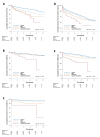Association between Preoperative Nutritional Status and Clinical Outcomes of Patients with Coronary Artery Disease Undergoing Percutaneous Coronary Intervention
- PMID: 32370130
- PMCID: PMC7282248
- DOI: 10.3390/nu12051295
Association between Preoperative Nutritional Status and Clinical Outcomes of Patients with Coronary Artery Disease Undergoing Percutaneous Coronary Intervention
Abstract
Background: Malnutrition is associated with poor outcomes in patients with cancer, heart failure and chronic kidney disease. This study aimed to investigate the predictive value of the Controlling Nutritional Status (CONUT) score in coronary artery disease (CAD) patients.
Methods: We recruited a cohort of 3118 patients with CAD undergoing percutaneous coronary intervention (PCI) from 2005 to 2015. Nutritional status was evaluated using the CONUT score, with higher scores reflecting worse nutritional status.
Results: After adjustment for comorbidities and medication, an increased CONUT score was independently associated with a higher risk of acute myocardial infarction (AMI) (HR: 1.13; 95% CI: 1.03-1.24), cardiovascular (CV) death (HR: 1.18; 95% CI: 1.07-1.30), congestive heart failure (CHF) (HR: 1.11; 95% CI: 1.04-1.18), a major adverse cardiovascular event (MACE) (HR: 1.14; 95% CI: 1.07-1.22), and total CV events (HR: 1.11; 95% CI: 1.07-1.15). The subgroup analyses demonstrated that the association of the CONUT score existed independently of other established cardiovascular risk factors. In addition, CONUT significantly improved risk stratification for myocardial infarction (MI), cardiac death, CHF, MACEs and total CV events compared to conventional risk factors in CAD patients by the significant increase in the C-index (p < 0.05) and reclassification risk categories in cardiac death and MACEs. Conclusions The CONUT score improved the risk prediction of adverse events compared to traditional risk factors in CAD patients after percutaneous coronary intervention (PCI).
Keywords: Controlling Nutritional Status (CONUT) score; coronary artery disease; nutrition; percutaneous coronary intervention; risk stratification.
Conflict of interest statement
All the authors declare no conflicts of interest.
Figures

Similar articles
-
Prognostic impact of nutritional status assessed by the Controlling Nutritional Status score in patients with stable coronary artery disease undergoing percutaneous coronary intervention.Clin Res Cardiol. 2017 Nov;106(11):875-883. doi: 10.1007/s00392-017-1132-z. Epub 2017 Jun 20. Clin Res Cardiol. 2017. PMID: 28634674
-
Impact of nutritional assessment and body mass index on cardiovascular outcomes in patients with stable coronary artery disease.Int J Cardiol. 2017 Mar 1;230:653-658. doi: 10.1016/j.ijcard.2017.01.008. Epub 2017 Jan 4. Int J Cardiol. 2017. PMID: 28077227
-
Association of Controlling Nutritional Status Score With 2-Year Clinical Outcomes in Patients With ST Elevation Myocardial Infarction Undergoing Primary Percutaneous Coronary Intervention.Heart Lung Circ. 2020 Dec;29(12):1758-1765. doi: 10.1016/j.hlc.2020.02.017. Epub 2020 Apr 14. Heart Lung Circ. 2020. PMID: 32622915
-
Association of Controlling Nutritional Status Score With Adverse Outcomes in Patients With Coronary Artery Disease: A Systematic Review and Meta-Analysis.Angiology. 2023 Feb;74(2):149-158. doi: 10.1177/00033197221094409. Epub 2022 Apr 30. Angiology. 2023. PMID: 35491724 Review.
-
Percutaneous intervention versus coronary artery bypass graft surgery in left main coronary artery stenosis: a systematic review and meta-analysis.BMC Med. 2017 Apr 21;15(1):84. doi: 10.1186/s12916-017-0853-1. BMC Med. 2017. PMID: 28427392 Free PMC article. Review.
Cited by
-
Relationship between Nutritional Status and Clinical and Biochemical Parameters in Hospitalized Patients with Heart Failure with Reduced Ejection Fraction, with 1-year Follow-Up.Nutrients. 2020 Aug 4;12(8):2330. doi: 10.3390/nu12082330. Nutrients. 2020. PMID: 32759722 Free PMC article.
-
Establishment and evaluation of a nomogram for in-hospital new-onset atrial fibrillation after percutaneous coronary intervention for acute myocardial infarction.Front Cardiovasc Med. 2024 Mar 18;11:1370290. doi: 10.3389/fcvm.2024.1370290. eCollection 2024. Front Cardiovasc Med. 2024. PMID: 38562185 Free PMC article.
-
Prediction models for major adverse cardiovascular events following ST-segment elevation myocardial infarction and subgroup-specific performance.Front Cardiovasc Med. 2023 Apr 25;10:1181424. doi: 10.3389/fcvm.2023.1181424. eCollection 2023. Front Cardiovasc Med. 2023. PMID: 37180806 Free PMC article.
-
Nutritional status and risk of contrast-associated acute kidney injury in elderly patients undergoing percutaneous coronary intervention.Clin Exp Nephrol. 2021 Sep;25(9):953-962. doi: 10.1007/s10157-021-02061-4. Epub 2021 Apr 12. Clin Exp Nephrol. 2021. PMID: 33844109 Free PMC article.
-
The Association of Controlling Nutritional Status Score and Prognostic Nutritional Index with Cardiovascular Diseases: the Fukuoka Kidney Disease Registry Study.J Atheroscler Thromb. 2023 Apr 1;30(4):390-407. doi: 10.5551/jat.63501. Epub 2022 Jul 8. J Atheroscler Thromb. 2023. PMID: 35811136 Free PMC article.
References
-
- Moran A.E., Forouzanfar M.H., Roth G.A., Mensah G.A., Ezzati M., Murray C.J., Naghavi M. Temporal trends in ischemic heart disease mortality in 21 world regions, 1980 to 2010: The Global Burden of Disease 2010 study. Circulation. 2014;129:1483–1492. doi: 10.1161/CIRCULATIONAHA.113.004042. - DOI - PMC - PubMed
-
- Agra Bermejo R.M., Gonzalez Ferreiro R., Varela Roman A., Gomez Otero I., Kreidieh O., Conde Sabaris P., Rodriguez-Manero M., Moure Gonzalez M., Seoane Blanco A., Virgos Lamela A., et al. Nutritional status is related to heart failure severity and hospital readmissions in acute heart failure. Int. J. Cardiol. 2017;230:108–114. doi: 10.1016/j.ijcard.2016.12.067. - DOI - PubMed
MeSH terms
LinkOut - more resources
Full Text Sources
Medical
Miscellaneous

